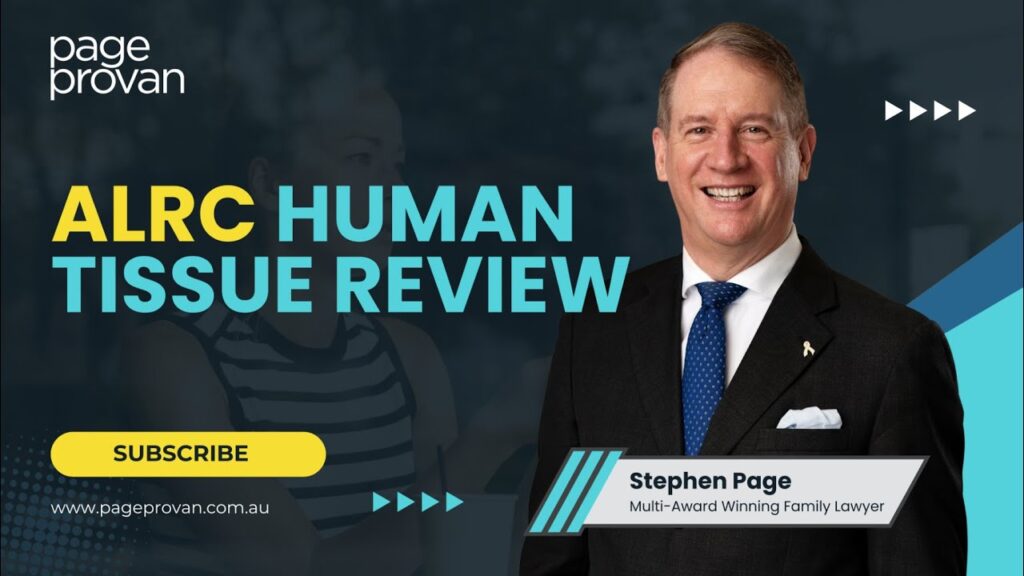The Ethics of Surrogacy
In this video, Page Provan director and award-winning fertility lawyer Stephen Page discusses a complex case of a brother and sister to reveal the ethics of surrogacy.
Transcript
G’day Stephen Page from Page Provan Family and Fertility Lawyers, and a recent topic that’s been in the news concerns a couple. Well, they’re not really a couple, a brother and sister, Robert and Jeanine from France. They were getting of a certain age and they were concerned that their cousins might inherit and they decided to have children.
Well, of course, they couldn’t have children together because they’re brother and sister, but they decided each of them would have a child, and given that surrogacy in France is illegal, they decided to go to a place that isn’t that far away, but where French people tend to go for surrogacy, which it was the United States, and off they went to California, and they used Robert’s sperm, an egg from an egg donor.
So they had a surrogacy agency or an egg donor agency to help them, and created a number of embryos, and one of those embryos was implanted into a surrogate, and one of those embryos was implanted into Jeanine. So the result was everything worked.
Two children were born, one being the child of Robert and one being the child of Jeanine. But of course, these children are genetic siblings, being comprised ultimately of Robert’s DNA and the DNA of an egg donor, and there’s been some disquiet, as often happens with surrogacy about, was this ethical?
One of the things you learn when you look at surrogacy for any length of time is that they’re really conflicting ethics. It’s really complex, and as Human Rights Watch and the International Women’s Health Coalition said human rights in this area is nascent, it’s just beginning.
We’re just seeing how it plays out because we have human rights of a whole lot of people involved. For example, the intended parents, donors of genetic material, the surrogate, and most importantly, in my view, the child or children who are born, and so the concern has been raised.
Well, here they were as a couple, in effect, having children. But I must say, I don’t see it like that. I see this as brother and sister who are having children who, when born, are very clear you are my father, you are my mother, and therefore knowing their place in the world, knowing that the children are first cousins, but also identifying them as genetic siblings.
I don’t see that as being unethical. Certainly, there’s no incest I would have thought involved with that, none of Jeanine’s genetics were used. Instead, Robert, in effect, was acting as a sperm donor for Jeanine, and they had the same egg donor. I think the good thing about that journey is that obviously the siblings, Robert and Jeanine, thought very carefully about it, and didn’t put themselves forward as a couple.
It clearly would have been unethical for them to do that. They don’t live together as a couple presumably, they’re not married to each other. They had these, in effect, parallel journeys as siblings, and given that each of their parents are single, and siblings with the whole family and now the world knowing about the journey.
It’s only a question of time before the children are told, This is how you were created. So, I hope that there is, for the sake of these children, a great sense of honesty from the very beginning, transparency. Certainly, social scientists tell us the greater the transparency from the beginning about an individual’s conception, the better.
Everyone’s conception is unique to them, and how was I created? Well, here’s the story and just tell the truth. Don’t engage in a cover-up, and explain that they were created through a process of love or maybe inheritance issues, I don’t know.
But just be upfront with them. So I’m not as concerned about it as some in the media are. There’s certainly a bent by some particular in Europe against any form of surrogacy.
But we must always take care with surrogacy about the various ethical conundrums that are involved, the various ethical problems and particularly focus, as has been the focus with these children on how the kids turn out.
There is nothing more powerful than talking to a donor, conceived adult who feels that they really haven’t had the truth shared with them, haven’t been told where they really came from. I hope for the sake of these children that they are told, I figured they will be given it’s been the world’s media and they will be the better for it. Thank you.












